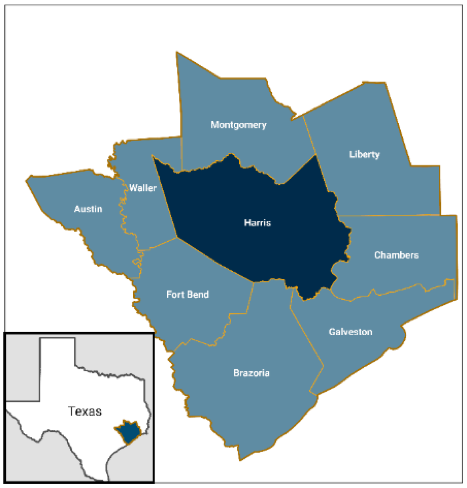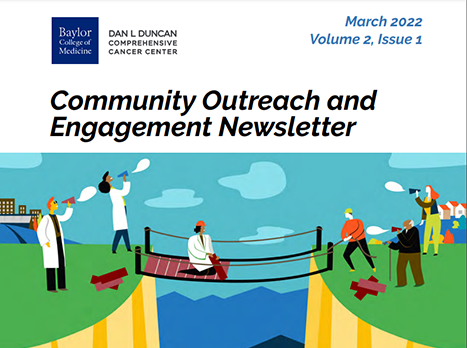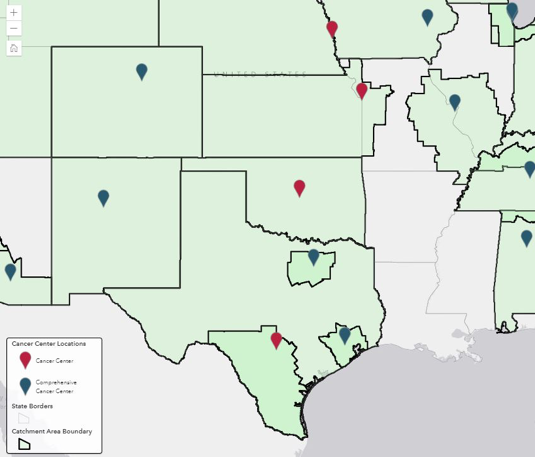About Us

The Dan L Duncan Comprehensive Cancer Center is one of four NCI-designated Cancer Centers in Texas covering a large geographic area. Through our partnerships with CHI St. Luke’s and Texas Children’s Hospital, the DLDCCC has expanded its catchment area to include the broader Houston Metropolitan Statistical Area. The Houston MSA is a geographic area that includes Harris and eight surrounding counties, representing a diverse population of more than 7 million individuals (with 67 percent living in Harris County), and is a major focus of our research, clinical care, education, and outreach programs including the underserved in the community.
Our catchment area is younger than the U.S. average, with 27.1 percent below 18 years of age versus 23.1 percent for the United States. Notably, our catchment area has twice the percentage of Hispanic/Latinos as the United States. (37.3 percent vs. 18.3 percent), and a considerably lower percentage of non-Hispanic Whites (65.9 percent vs. 76.5 percent). Compared to the United States, our catchment area population has a higher percentage of adults with less than a high school education (17.7 percent vs. 13.1 percent), higher rates of poverty, both for all ages (12.3 percent) and for children ≤ 18 years (9.9 percent), and highest uninsured rates in the nation for non-Medicare aged population (26.4 percent vs 16.4 percent). The DLDCCC Community Outreach and Engagement programs thus play an important role in filling significant gaps in catchment area cancer prevention and control.

In June 2021, the COE program began publishing a Community Outreach and Engagement Newsletter which was distributed among the DLDCCC membership to highlight their community engaged work for the year 2020. In March 2022, the COE published and distributed the latest issue of the newsletter presenting work done in 2021. To access the first issue of the COE Newsletter, visit the newsletter archival site. (BCM Login Required)
APPLY HEAT Special Interest Group
The Apply Health Equity in Healthcare Delivery And Translational Science Across the Cancer Continuum is a forum to network, learn, and explore multidisciplinary approaches to cancer health equity research. In collaboration with Cancer Prevention and Population Sciences, COE is providing a platform where Dan L Duncan Comprehensive Cancer Center members, their Disease Working Groups, and the broader Houston community stakeholders can work together and develop strategies to address cancer burden and disparities in our catchment area. The objective is to identify and establish cross-disciplinary collaborative projects eligible for multi-investigator funding or with the potential of translating discoveries from bench to bedside to general community settings. This initiative was launched in the Spring of 2022 under the leadership of Dr. Jane Montealegre, Dr. Karen Riggins, and Dr. Stacy Lloyd. The group has virtual meetings on the third Friday of each month at 10 a.m. CT. Interested in participating? Contact: DLDCCC-COE@bcm.edu.
How We Can Assist
The COE is available to support community-engaged research projects targeting catchment area priorities by facilitating community partnerships and through resource development and implementation.
As part of our ongoing assessment of the cancer burden in the DLDCCC catchment area, we utilize a community-based participatory research approach to monitor catchment area needs and ensure the equitable bi-directional exchange of knowledge between communities and researchers. To this end, COE works closely with the DLDCCC Community Advisory Board to identify community partners’ interests and priorities and serve as nexus for the communication and interactions between the community stakeholders and the DLDCCC Research Programs and Disease Working Groups.
Some of the topics where we may assist are:
- Description of the cancer burden and disparities in the DLDCCC catchment area
- Summaries of the demographics of the DLDCCC catchment area
- Summaries of the ethnic and racial characteristics of DLDCCC patients (by clinic)
- Facilitation of engagement with CAB members and other community stakeholders
- Consultation on cancer education resource development for patient, community/public, and provider instruction
- Consultation on grant applications or pilot projects addressing catchment area issues, health disparities, or community outreach and engagement
- Consultation to strengthen dissemination and implementation science research
- Participation of COE members in DLDCCC Disease Working Group as ad hoc members
- Support for educational efforts to increase minority participation in clinical research
Resources
DLDCCC Catchment Area Online Repository for Resources
We encourage faculty members interested in conducting research that addresses cancer disparities in the DLDCCC catchment area to access the online repository of resources available in the BCM Box folder titled “DLDCCC Catchment Area Resources for Faculty.” These resources include a summary of cancer burden and priorities for our catchment area, Texas Cancer Registry cancer incidence and mortality rates by county, a slide set with additional information (i.e., maps, figures, graphs) about the DLDCCC catchment area priorities, as well as an archive of our previous annual Community Outreach and Engagement Newsletters.
Access the BCM Box Folder “DLDCCC Catchment Area Resources for Faculty". (BCM Login Required)
NCI-Designated Cancers Centers Visualization Tool

The NCI-Designated Cancers Centers Visualization Tool is available for DLDCCC faculty members as well as anyone in the community interested in cancer disparities research. This novel and interactive web-based tool was developed by the Division of Cancer Control and Population Sciences, along with the Division of Cancer Epidemiology and Genomics and NCI Office of Cancer Centers. As of May 2021, the user can visualize 63 catchment areas under the 71 NCI-designated Cancer Centers. By and large, this tool can help locate the geographic scope for monitoring cancer trends, identifying socioeconomic- and health-related disparities, and guiding the implementation of evidence-based interventions in clinical and community settings. Development of this web tool will continue to evolve to link Cancer Center’s catchment areas to publicly available data sources.
Additional Information
Contact us at DLDCCC-COE@bcm.edu, if you need additional information, have questions about the catchment area priorities, or would like to consult with us on community-engaged research, outreach and education support.
Learn More About Our Work
The COE employs multi-pronged strategies to engage with communities in our catchment area – most of this work is done by the Office of Outreach and Health Disparities. To learn about our work, we encourage you to visit the COE/Office of Outreach and Health Disparities website where we present community-engaged research collaborations, cancer prevention outreach programs, cancer education resources, clinical trials support and other ongoing efforts.








